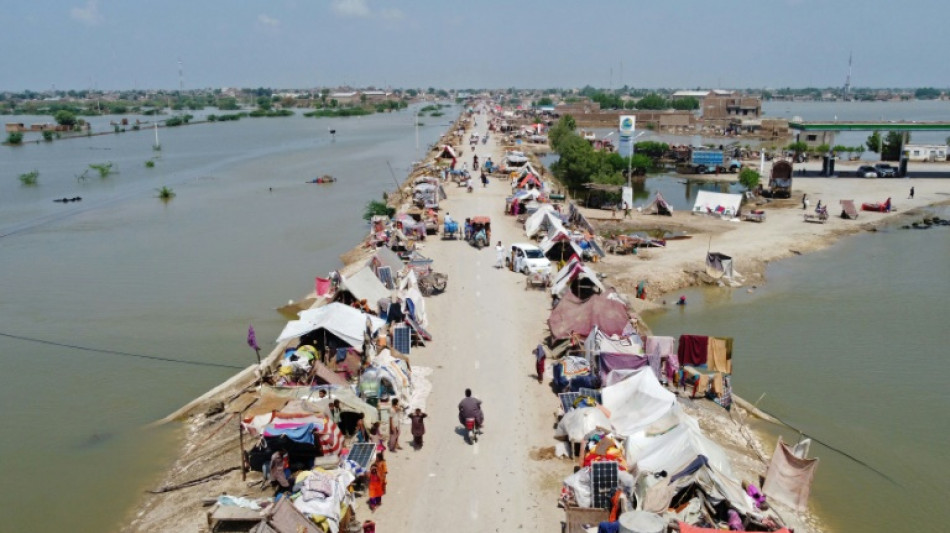
-
 SFWJ / Medcana Announces Strategic Expansion Into Australia With Acquisition of Cannabis Import and Distribution Licenses
SFWJ / Medcana Announces Strategic Expansion Into Australia With Acquisition of Cannabis Import and Distribution Licenses
-
US to withdraw some 1,000 troops from Syria

-
 Four killed after spring storms wreak havoc in the Alps
Four killed after spring storms wreak havoc in the Alps
-
Spurs' Popovich reportedly home and well after 'medical incident'

-
 Trump goes to war with the Fed
Trump goes to war with the Fed
-
Celtics chase second straight NBA title in playoff field led by Thunder, Cavs

-
 White House site blames China for Covid-19 'lab leak'
White House site blames China for Covid-19 'lab leak'
-
Norris edges Piastri as McLaren top Jeddah practice

-
 Trump warns US could ditch Ukraine talks if no progress
Trump warns US could ditch Ukraine talks if no progress
-
Judge denies Sean 'Diddy' Combs push to delay trial

-
 80 killed in deadliest US attack on Yemen, Huthis say
80 killed in deadliest US attack on Yemen, Huthis say
-
Lebanon says two killed in Israeli strikes in south

-
 Trump says US will soon 'take a pass' if no Ukraine deal
Trump says US will soon 'take a pass' if no Ukraine deal
-
F1 success is 'like cooking' - Ferrari head chef Vasseur

-
 Cycling mulls slowing bikes to make road racing safer
Cycling mulls slowing bikes to make road racing safer
-
Macron invites foreign researchers to 'choose France'

-
 Klopp 'happy' in new job despite Real Madrid rumours: agent
Klopp 'happy' in new job despite Real Madrid rumours: agent
-
Alcaraz into Barcelona semis as defending champion Ruud exits

-
 Vance meets Italy's Meloni before Easter at the Vatican
Vance meets Italy's Meloni before Easter at the Vatican
-
Evenepoel returns with victory in Brabantse Pijl

-
 Maresca confident he will survive Chelsea slump
Maresca confident he will survive Chelsea slump
-
Mob beats to death man from persecuted Pakistan minority

-
 Lebanon says one killed in Israeli strike near Sidon
Lebanon says one killed in Israeli strike near Sidon
-
Arsenal's Havertz could return for Champions League final

-
 US officials split on Ukraine truce prospects
US officials split on Ukraine truce prospects
-
Client brain-dead after Paris cryotherapy session goes wrong

-
 Flick demands answers from La Liga for 'joke' schedule
Flick demands answers from La Liga for 'joke' schedule
-
'Maddest game' sums up Man Utd career for Maguire

-
 Trial opens for students, journalists over Istanbul protests
Trial opens for students, journalists over Istanbul protests
-
Gaza rescuers say Israeli strikes kill 24 after Hamas rejects truce proposal

-
 'Really stuck': Ukraine's EU accession drive stumbles
'Really stuck': Ukraine's EU accession drive stumbles
-
'Not the time to discuss future', says Alonso amid Real Madrid links

-
 74 killed in deadliest US attack on Yemen, Huthis say
74 killed in deadliest US attack on Yemen, Huthis say
-
Southgate's ex-assistant Holland fired by Japan's Yokohama

-
 Vance meets Meloni in Rome before Easter at the Vatican
Vance meets Meloni in Rome before Easter at the Vatican
-
Ryan Gosling to star in new 'Star Wars' film

-
 Hamas calls for pressure to end Israel's aid block on Gaza
Hamas calls for pressure to end Israel's aid block on Gaza
-
Russia says Ukraine energy truce over, US mulls peace talks exit

-
 58 killed in deadliest US strike on Yemen, Huthis say
58 killed in deadliest US strike on Yemen, Huthis say
-
Museums rethink how the Holocaust should be shown

-
 Three dead after deadly spring storm wreaks havoc in the Alps
Three dead after deadly spring storm wreaks havoc in the Alps
-
No need for big changes at Liverpool, says Slot

-
 Bloody Philippine passion play sees final performance of veteran 'Jesus'
Bloody Philippine passion play sees final performance of veteran 'Jesus'
-
New US envoy prays, delivers Trump 'peace' message at Western Wall

-
 Postecoglou sticking around 'a little longer' as Spurs show fight in Frankfurt
Postecoglou sticking around 'a little longer' as Spurs show fight in Frankfurt
-
US threatens to withdraw from Ukraine talks if no progress

-
 Tears and defiance in Sumy as Russia batters Ukraine border city
Tears and defiance in Sumy as Russia batters Ukraine border city
-
Russia rains missiles on Ukraine as US mulls ending truce efforts

-
 Tokyo leads gains in most Asian markets on trade deal hopes
Tokyo leads gains in most Asian markets on trade deal hopes
-
Two missing after deadly spring snowstorm wreaks havoc in the Alps


Pakistan floods highlight need for climate 'loss and damage' help
Rich carbon polluters should feel "moral pressure" to help fund climate-vulnerable nations wracked by weather extremes such as Pakistan, where monstrous flooding has caused devastation, diplomats and observers told AFP.
Torrential monsoon rains have killed more than a thousand, left a third of Pakistan under water and displaced hundreds of thousands, months after the country was scorched by record-shattering heat, intensified by climate change.
While it is too early to quantify the contribution of warming, scientists say the rains are broadly consistent with expectations that climate change will make the Indian monsoon wetter.
The United Nations chief has called them a "climate catastrophe".
"This is not a freak accident," said Nabeel Munir, Pakistan's ambassador to Seoul and chair of the largest negotiating bloc of developing nations at UN climate negotiations.
"The science proves the frequency and the impact of these disasters is only going to increase and we have to be prepared for that."
The human and economic impact is already staggering and "this is an ongoing disaster; the rains are still going on", he told AFP.
Countries like Pakistan that have contributed the least to global warming are often battered by the worst impacts, observers say.
Pressures are mounting for UN negotiations in November to ringfence specific "loss and damage" funding for countries slammed by increasingly extreme and expensive climate impacts.
The issue will be thrown into sharp relief with Pakistan fronting the important G77+China bloc -- representing more than a hundred nations and a significant proportion of the global population -- as it reels from weather disasters.
Munir said wealthy nations that have contributed the most to climate change from burning fossil fuels should recognise their role and provide more funding to help vulnerable countries, adding that the UN process so far had produced "not even peanuts" for loss and damage.
"We will continue the moral pressure. But I think a lot of the political and moral pressure has to come from within these countries," he said.
Pakistan has contributed less than 0.5 percent of heat-trapping emissions pumped into the atmosphere since the Industrial Revolution, said Kristina Dahl, principal climate scientist at the Union of Concerned Scientists. The United States is responsible for 25 percent.
"Understanding the forces behind disasters like Pakistan's current floods is an important step toward holding developed nations accountable for the changes they have wrought," she told AFP.
- 'Unliveable' heat threat -
In March a blistering hot spell began to develop across parts of South Asia, with Pakistan registering record temperatures.
Scientists from the World Weather Attribution climate group estimated that climate change had made the heatwave 30 times more likely.
The region's "breadbasket" in northwestern India and south Pakistan was particularly affected. Crops wilted, while sheep collapsed and died of heatstroke.
In May the temperatures were still spiking.
"We had temperatures in the cities touching 50 degrees (Celsius, 122 degrees Fahrenheit), can you even imagine?" said Munir.
"There are cities which might become unliveable because of the temperatures they will regularly have."
And the heat had another devastating effect in a country home to more than 7,000 glaciers, the largest number for any region outside the poles.
Quickly melting glaciers can saturate the landscape and cause glacial lake outburst floods, unleashing torrents of ice, rock and water.
That can lead to a "compound effect where we've got higher than average river levels, on top of higher than average rainfall", said Helen Griffith, a researcher of hydrology and environmental science at the University of Reading.
While Pakistan suffered severe flooding in the heavy monsoon of 2010, she said rainfall this year was "unprecedented" and deluging areas where people would never have experienced rains on this scale.
In Balochistan province rainfall was 466 percent higher than normal, Munir said, while the country itself has had three times the national average.
So far the floods have affected around 33 million people, destroyed nearly a million homes and wiped out almost 200 bridges and 3,500 kilometres (2,200 miles) of roads, hampering efforts to reach those in need.
Some 800,000 livestock and two million acres (809,000 hectares) of farmland have been "washed away", Munir said, threatening food security in the coming months.
- 'Undermined' -
The UN is trying to raise $160 million for humanitarian relief.
But that money is for people in immediate crisis -- and there is no guarantee it will come.
Meanwhile, Pakistan's government has put the estimated rebuilding costs at around $10 billion.
While humanitarian aid following disasters like the Pakistan floods can assist, "developing countries need to be able to rely on a longer-term and consistent source of resources as the impacts of climate change mount," said Dahl.
High-income emitters, particularly the US and European Union, have "consistently undermined" efforts to address loss and damage, she said.
After richer nations failed to meet a promise of $100 billion a year by 2020 to help developing countries adapt to future climate impacts, finance and global inequality will be a key flashpoint at November's UN talks in Egypt.
A recent study, based on climate models, predicted that exceptionally wet monsoons in the Indian subcontinent would become six times more likely during the 21st century, even if humanity rachets down carbon emissions.
"It's an established fact: this is happening because of climate change," Munir said.
"So the funding has to come from somewhere and you know where that somewhere is."
P.Stevenson--AMWN